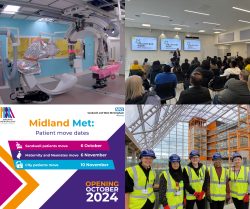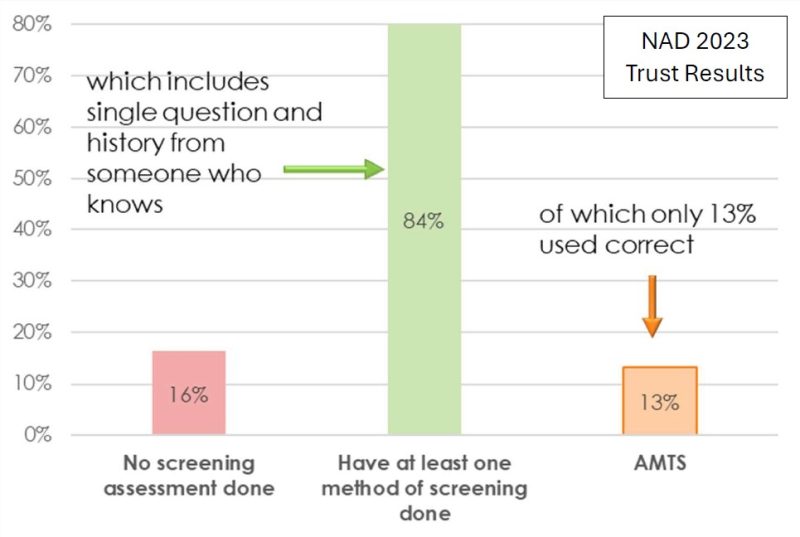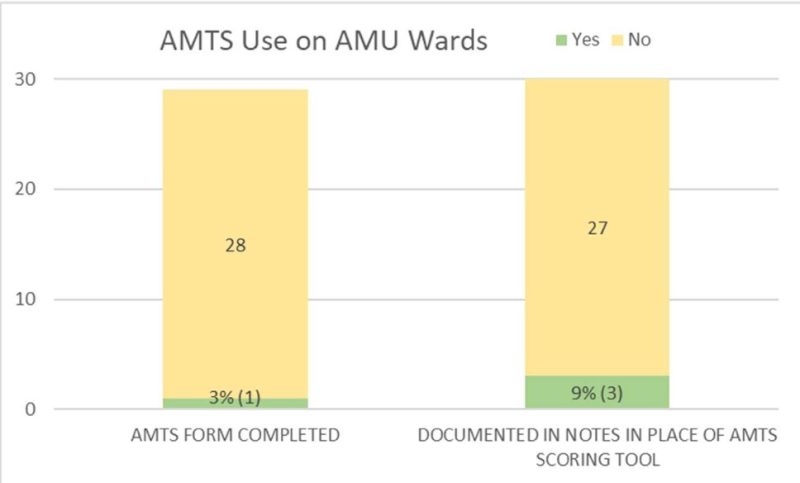Monthly archives: June 2024
Chief Executive’s Message – Friday 7 June

With a little under four months until we open our doors to Midland Metropolitan University Hospital, length of stay (LOS) is a continuing issue for us. We are at risk of not being able to fit into the new hospital and one of the main determinants of this is that some patients stay in our hospital beds for too long.
We still have work to do around bed fit /rightsizing into the new hospital and there are several improvements (as part of our overall urgent care project in our annual plan) that are on-going which target this. These include frailty, medical SDEC, virtual wards , heart failure, falls and respiratory and we can take reassurance that we have seen some sustained improvement from many of these schemes.
I want to thank you all for your hard work supporting this, but now we really need to heighten the focus of our actions in three areas.
So, to accelerate this work and progress us to fit into the hospital we are adopting a quality improvement sprint methodology based on :-
- Ward-based length of stay on medical wards – our length of stay has gone up by 15 per cent since December 2022
- Our pathway via medical SDEC
- Streaming of urgent care patients presenting at our two emergency departments.
In December 2022, we were within the safe threshold on bed utilisation to fit into MMUH, but with now less than 16 weeks to go we need your help and professional expertise to solve this issue and allow us to fit at ease into the new hospital. If you are part of this work or asked to support, please do so, we need your valuable insight and input to get us safely over the line.
In other MMUH updates, this week we started the Abbott track system installation, this complements the Abbott Anility analysers that were installed recently and brings a new level of process automation to pathology. The cardiac catheter labs are being installed with the first one arriving and being installed this week and imaging work has started with the installation of our new SPECT/CT scanner in nuclear medicine.
We have also now had over 600 staff sign up for their staff induction site tour. It is imperative that you do this before we move so, if you are yet to sign up, please do so by clicking here.
As you will also be aware with the Trust move to agile working and to help everyone adjust smoothly there is a whole host of information available on Connect. We are also running a series of interactive webinars. These will provide expert insights, tips and a chance to ask any questions that you or your team may have and are designed to be supportive and informative. The full list of dates can be found by clicking here.
Finally, I would also like to say a huge thank you to all our volunteers for their dedication to the Trust. As you may be aware, this week is Volunteers’ Week which is an annual celebration of the fantastic contribution millions of volunteers make across the UK. Right here at the SWB, we have a number of volunteers who support us to deliver first-class healthcare to our patients. To celebrate the awareness week, we hosted two special events to thank all our volunteers for their hard work over the last 12 months.
Have a good weekend.
Kind regards,
Richard
Lynch Syndrome Project Webinar – 2 July
Lynch syndrome is an inherited condition that causes people to have a higher lifetime risk of colorectal, endometrial, and other cancers. 1 in 400 people in the UK are affected by Lynch syndrome, but only an estimated 5% of those people have been diagnosed.
On Tuesday 2 July, Central and South Genomics is hosting a webinar to update healthcare professionals in our region on the project and discuss developments in diagnosis and treatment.
Alongside North Thames and South East Genomic Medicine Service Alliances, Central and South Genomics is working on the project to improve the identification and management of Lynch Syndrome, bridging the gap in testing and diagnosis of Lynch Syndrome and supporting the early detection of cancer and access to personalised care.
The aim of the project is to test every patient who develops bowel or endometrial cancer for Lynch syndrome; and then to embed new pathways for onward testing, surveillance and referrals for positive patients and their families. The project aims to improve early detection of cancers as well as personalised medical care.
Join Central and South Genomics on Tuesday 2 July 2024 to learn more about this crucial project. Please register here.
Meet our staff induction guru – Holly Burns guide to July’s staff induction

Continuing with our induction lead stories ahead of the Midland Met inductions in July, this week we’re profiling the Project Coordinator for the Midland Met Induction Programme, Holly Burns.
After working at the QE Hospital as a safeguarding compliance manager for seven years, Holly’s love and passion for projects led her to the path of Midland Met. Holly explained: “I always find myself wanting to know the answer to things and having a drive to learn. This is an exciting project to be part of.”
https://youtu.be/TcQ3pNJePi8
Since joining in March 2023, a big part of Holly’s role has involved supporting the induction leads in collating information into their documents and supporting the development of the induction programme. She adds: “I’m one of the key contacts for the induction leads across the Trust. I keep them informed on the processes for launching the induction and the areas to be completed, to feed back to wider teams.”
Naturally, colleagues will wonder what is involved in the staff inductions. Holly outlines the process: “The induction contains a few components. The first is a general induction which is mandatory for all colleagues working at Midland Met. It involves interactive video modules and an area-based induction where colleagues can watch departmental walkthrough films and learn about the new processes at Midland Met. They’ll also be information about new equipment training and, of course, site induction tours.”
To ensure a safe transition, Holly stresses the importance of all parts of the induction programme. Ahead of the induction launch, please keep a look out for more staff comms and don’t hesitate to contact the team if you need any information via swbh.mmuhinduction@nhs.net.
Reasonable Adjustment Digital Flag programme
This learning session aims to introduce the Reasonable Adjustment Digital Flag and how this can be used to address some of the significant health inequalities experienced by people living with a disability or impairment.
By law (the Equality Act 2010) all people who have a disability or impairment are entitled to reasonable adjustments. Without these adjustments, people with disabilities may have equal access to care and services, but without specific adjustments being made, that access might not be equitable or fair.
Reasonable adjustments are the responsibility of everyone in the health and social care sector and this session will help you understand that these adjustments are not just the right thing to do, but may be the difference between someone receiving essential care or not. It will explain how the Reasonable Adjustment Digital Flag can help you and your organisation meet your obligations under the Equality Act and how you could make a real difference to the estimated 28% of the population in England that this affects.
This is separate to the Oliver McGowan mandatory training.
The aims of this elearning are:
- to improve understanding of the ethical needs and legal requirements of anticipating and implementing person centred reasonable adjustments for all those people who have a disability or significant impairment
- to lead to all staff identifying, recording, flagging, sharing and meeting people’s reasonable adjustment needs, so that this becomes business as usual
- to explain how the Reasonable Adjustment Digital Flag can help you make a real difference to the lives of disabled people
The anticipated length of the session is 30 to 60 minutes.
The Reasonable Adjustment Digital Flag programme is available to NHS healthcare staff via the Electronic Staff Record (ESR). Accessing this e-learning via ESR means that your completions will transfer with you throughout your NHS career.
Importance of AMTS Dementia Assessment Tool
Importance of AMTS Dementia Assessment Tool
Early detection is the key to successfully tackling Dementia, being an umbrella term of symptoms of a neurological condition among people aged over 65. Therefore, screening all admitted patients over the age of 65 years via a standardised cognitive test, can provide an important opportunity to identify cognitive impairment. This can speed up the diagnosis process and improve accessibility to support for People Living with Dementia (PLWD) and their carers and where appropriate, treatment commenced. Often people are turned away from services without a diagnosis so the faster a diagnosis is made, the better outcomes are anticipated.
What is Dementia cognitive impairment assessment?
National guidance clearly states that all Elderly patients aged 65 and over on admission (usually the first place would be AMU) should have a proper cognitive assessment.
The recent National Audit of Dementia (NAD) show that we are not particularly good at doing or recording an Abbreviated Mental Test Scoring (AMTS) assessment – from a sample of 135 patients, 84% of patients included at least one method of assessing delirium and/or dementia, but only 13% had the recognised AMTS recorded (Graph 1).
There is one side to that (the golden rule);“if it’s not written down, it didn’t happen”. But more importantly, we may be missing signs of early dementia and ensuring appropriate therapies are started, and where appropriate medication (‘Live well with Dementia’)


Are we using AMTS Dementia Assessment Tool?
We recently conducted a one-day observation audit for all patients aged 65+ on AMU wards across both acute hospital sites and the results confirmed what’s long been perceived as a problem area (Graph 2). Despite there being an AMTS Dementia assessment form on UNITY for some time already, it’s not being utilised as clearly indicated by audit data. Discussions with clinicians on the wards during the audit day in May 2024, revealed most medics were not aware of the form.
Why it’s important to use the AMTS tool on UNITY?
It will make data collection for NAD swifter and smoother, as it’s easily identified in Form Browser. Also allows local monitoring for The Vulnerable Adults Team (incl. Dementia Nurse) resulting in better identification for medics when they should request GP to FU within discharge letters. Overall, this work also feed into the national and Trust concepts of ‘Right Care at the Right Time’ and ‘Getting it Right the First Time’ as well as the national strategy of ensuring patients ‘Live Well with Dementia’.
See our quick guide on how to access the AMTS Dementia assessment form on UNITY.
https://connect2.swbh.nhs.uk/amts-dementia-screening-unity-guide/
For Dementia training with Dementia Nurse please get in touch with team administrator Rugina Begum: r.begum19@nhs.net
If you would like to do an audit in your area on Dementia, please contact the Clinical Effectiveness team – swbh.AuditTeam-ClinEffec@nhs.net
Click here to access the clinical effectiveness resources.
Blue Light Card launches brand-new Voucher Shop

Blue Light Card have announced the launch of a brand-new Voucher Shop, designed to help NHS staff save even more on everyday essentials, monthly treats, gifts for loved ones, and so much more!
Blue Light Card’s Voucher Shop offers a variety of ways to save with instant vouchers, instant reloadable vouchers, and instant reloadable cards.
By partnering with Reward Gateway, Blue Light Card will bring you even greater discounts on your favourite brands such as Tesco, B&M, M&S, Uber, and many more!
We’re committed to helping NHS staff make their money go further, and with the Voucher Shop, it will! From instant reloadable cards and vouchers to scheduled auto top-ups, watch your savings grow on your everyday essentials.
Start saving today and make the most of the incredible discounts available through our new Voucher Shop.
Find out more here.
Personalised Care in Cancer conference – 25 September 2024
Colleagues are invited to our Personalised Care in Cancer conference on Wednesday 25 September 2024. The in-person event will delve into practical approaches to improving practice and outcomes for those living with and beyond cancer. Through showcasing local case studies, it will feature good practices to help deliver on the priorities outlined in the NHS Long Term Plan for cancer, specifically on personalised care and support. Attendees will also have the chance to discuss how we can collectively address the unmet needs of those living with and beyond cancer, to achieve equitable access and tailored care for individuals.
It promises to be a jam-packed event, with attendees gaining valuable insights and learning about best practices to gain a greater awareness and understanding of personalised care in cancer. It will also include stalls hosted by colleagues from across the system and beyond, including the Personalised Care team at University Hospitals Birmingham, MacMillan, Bowel Cancer UK and Breast Cancer Now. The full agenda is attached and event details are as follows:
Wednesday 25 September 2024
9.30am to 3pm
Location: Midlands Arts Centre, Birmingham, B12 9QH
To book your place, please click here and for any queries, please contact Kafilla Munir, Cancer Partnership Improvement Manager, NHS Birmingham and Solihull ICB.
Sad passing of Michael Roper-Hall

It is with great sadness that one of our much-loved former colleague Michael Roper-Hall sadly passed away on Friday 3 May at the age of 100.
Michael John Roper-Hall was an internationally renowned and respected world leader and true innovator in the fields of ocular trauma and intraocular microsurgery, becoming the first surgeon to introduce an ophthalmic operating microscope to the UK in 1957. Born in 1923, he qualified MBChB (Birmingham) in 1945, and began ophthalmic training at the Birmingham and Midland Eye Hospital (BMEH), passing his FRCS in 1948. Already a consultant at Bromsgrove General Hospital (1952) and the Midland Centre for Neurosurgery and Neurology (1955), he was appointed consultant at BMEH in 1957. He served the NHS for 61 years, during which time he initiated the development and use of intraocular lenses in cataract surgery and the procedure of osteo-odontokeratoprosthesis.
Over the years, Michael went on to achieve great things throughout his working career, to find out more about what he did by clicking here.
Michael was an inspiration to the huge number of ophthalmologists he trained and those who were fortunate enough to know him. He made lasting and significant contributions to ophthalmology, and his passing marks the end of an era for ophthalmologists throughout the world.
We send our condolences to Michael’s family and friends at this time.
Charity Cake Sale at BMEC: 11 June

On Tuesday 11 June from 10am – 4pm there will be a charity cake sale in aid of Roper Hall Eye Foundation and Your Trust Charity in out-patients at Birmingham Midlands Eye Centre.
All donations will be split between the charities.
If you fancy a slice, then come on down!
This week is Dietitians Week

This week is Dietitians Week and aims to raise awareness around Dietetics. Dietetic is the science of how nutrition affects our health. Studies have shown how a change to our diet can help prevent or control a variety of health problems, including obesity, diabetes and heart disease.
In the world of social media, there is a lot of dietary and nutritional advice in the media, but not all of it is evidence-based and may not be from reputable sources. However, dietitians are the only qualified health professionals that assess, diagnose and treat diet and nutrition problems.
Be sure to check out this short video featuring Rachel Wright, Team Leader for the paediatrics dietitians talking about top tips for introducing fruits and vegetables into our younger patient’s diet.
← Older items Newer items →